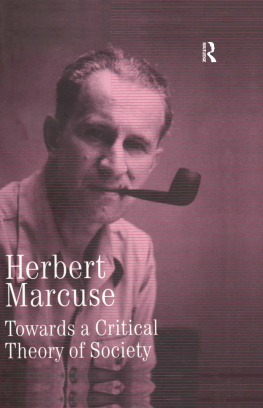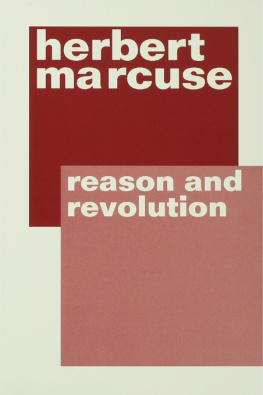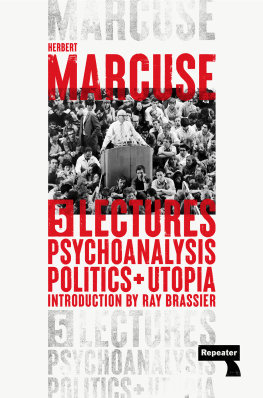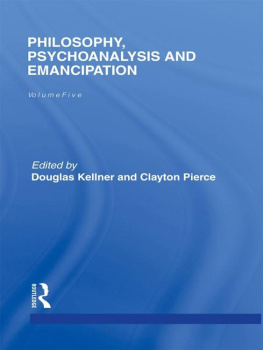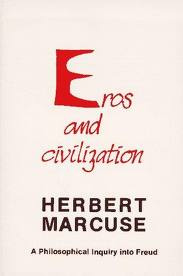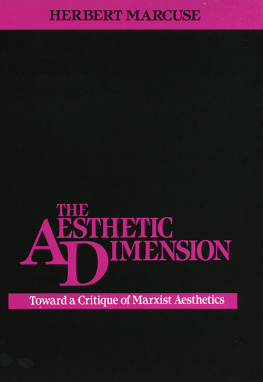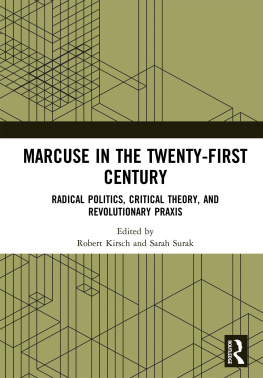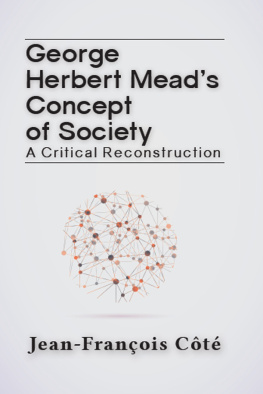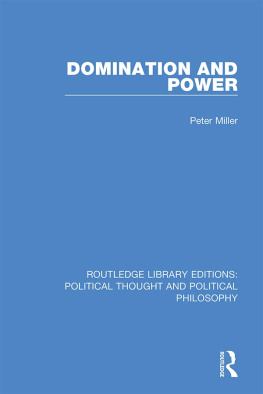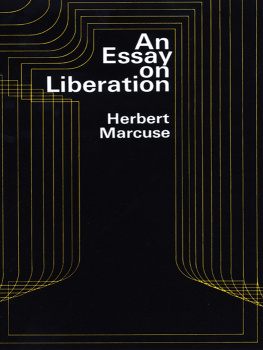Herbert Marcuse - Towards a Critical Theory of Society
Here you can read online Herbert Marcuse - Towards a Critical Theory of Society full text of the book (entire story) in english for free. Download pdf and epub, get meaning, cover and reviews about this ebook. year: 2013, publisher: Routledge, genre: Politics. Description of the work, (preface) as well as reviews are available. Best literature library LitArk.com created for fans of good reading and offers a wide selection of genres:
Romance novel
Science fiction
Adventure
Detective
Science
History
Home and family
Prose
Art
Politics
Computer
Non-fiction
Religion
Business
Children
Humor
Choose a favorite category and find really read worthwhile books. Enjoy immersion in the world of imagination, feel the emotions of the characters or learn something new for yourself, make an fascinating discovery.
- Book:Towards a Critical Theory of Society
- Author:
- Publisher:Routledge
- Genre:
- Year:2013
- Rating:3 / 5
- Favourites:Add to favourites
- Your mark:
- 60
- 1
- 2
- 3
- 4
- 5
Towards a Critical Theory of Society: summary, description and annotation
We offer to read an annotation, description, summary or preface (depends on what the author of the book "Towards a Critical Theory of Society" wrote himself). If you haven't found the necessary information about the book — write in the comments, we will try to find it.
Towards a Critical Theory of Society — read online for free the complete book (whole text) full work
Below is the text of the book, divided by pages. System saving the place of the last page read, allows you to conveniently read the book "Towards a Critical Theory of Society" online for free, without having to search again every time where you left off. Put a bookmark, and you can go to the page where you finished reading at any time.
Font size:
Interval:
Bookmark:
TOWARDS A CRITICAL THEORY OF SOCIETY
COLLECTED PAPERS OF HERBERT MARCUSE
EDITED BY DOUGLAS KELLNER
Volume One
TECHNOLOGY, WAR AND FASCISM
Volume Two
TOWARDS A CRITICAL THEORY OF SOCIETY
Volume Three
FOUNDATIONS OF THE NEW LEFT
Volume Four
ART AND LIBERATION
Volume Five
PHILOSOPHY, PSYCHOANALYSIS AND EMANCIPATION
Volume Six
MARXISM, REVOLUTION AND UTOPIA
TOWARDS A CRITICAL THEORY OF SOCIETY
HERBERT MARCUSE
COLLECTED PAPERS OF HERBERT MARCUSE
Volume Two
Edited by
Douglas Kellner

First published 2001
by Routledge
2 Park Square, Milton Park Abingdon, Oxon OX14 4RN
Simultaneously published in the USA and Canada
by Routledge
711 Third Avenue, New York, NY 10017, USA
Routledge is an imprint of the Taylor & Francis Group, an informa business
2001 Peter Marcuse
Selection and Editorial Matter 2001 Douglas Kellner
Afterword Jrgen Habermas
Typeset in Sabon by Keystroke, Jacaranda Lodge, Wolverhampton
All rights reserved. No part of this book may be reprinted or reproduced or utilized in any form or by any electronic, mechanical, or other means, now known or hereafter invented, including photocopying and recording, or in any information storage or retrieval system, without permission in writing from the publishers.
British Library Cataloguing in Publication Data
A catalogue record for this book is available from the British Library
Library of Congress Cataloging in Publication Data
Marcuse, Herbert, 1898
Towards a critical theory of society / Herbert Marcuse; edited by Douglas Kellner.
p. cm. (Collected papers of Herbert Marcuse; v. 2)
Includes bibliographical references and index.
1. SociologyPhilosophy. I. Kellner, Douglas, 1943 II. Title.
B945 .M298 1998 v. 2
[HM585]
301.01dc21 00053357
ISBN 978-0-415-13781-2 (hbk)
CONTENTS
PETER MARCUSE |
DOUGLAS KELLNER |
JRGEN HABERMAS |
Peter Marcuse
In reading these largely unpublished manuscripts of my fathers, I am struck by two things. The first has to do with the relationship of current events to long-term analysis that the selections in this volume, in particular, reveal. The second has to do, superficially, with style, but, more significantly, with the thought processes that the style reveals.
Many of these pieces were composed (some for talks, others as draft manuscripts) during the Vietnam war, as my father actively engaged himself in the day-to-day protest against it. His contribution was not particularly to marshal the arguments against the war, but rather to put it in the broader framework of developments in the economy of capitalism, in bourgeois democracy, and in the possible forms of resistance. Some of his judgments as to the extent of developments may seem today, with hindsight, to have been in part erroneous: the extent of formal repression, or the inability of the economic system to continue to produce. But the underlying analyses still ring very true. I would argue it is perhaps even more important today to develop a radical social critique, perhaps because the day-to-day conflicts do not seem as profound as they were then. Today, because the possibility of serious long-term change seems so remote, we tend to think less about the underlying problems and their importance, and the need for radical structural transformation.
But, as my father wrote elsewhere, utopias are no longer utopias because they can realistically be achieved today. It is thus important to consider what could be, alternative and better modes of social organization, even though, unlike then, such reflections are on the back burner today.
Above all, the theme that runs through virtually everything in this volume is the importance of the political, the fight against the depoliticization of all spheres of action, from academic economics to culture to politics itself. In later work, to be published in a subsequent volume in this series, he dealt explicitly with the political content of art in terms of a dialectic of form and content, rejecting the view that art, to be political, should be ornamented propaganda; there are hints even in the present pieces of his developing absorption in the role of art and the aesthetic dimension in the process of liberation. In the essays collected in this volume, he is concerned with the sources of social change, and sees in the growing material prosperity that capitalism has produced an increasing dehumanization that needs to be addressed in moral terms, and that means in political, rather than narrowly economic, struggle. The new 1966 preface to Eros and Civilization is called Political Preface, and ends: Today the fight for life, the fight for Eros, is the political fight. It is a moral and a political position that is grounded in a sharp theoretical analysis of current developments, and holds up well even where current developments have not gone entirely in the direction he anticipated.
As to style, I remember often, on first reading something he had published, swearing at the ambiguities of many phrases. I was trained as a lawyer, and sharpness of expression, precision, clarity, are highly prized, terms are given specific definitions, conclusions are drawn sharply and pressed one-sidedly. The result is often complex sentences, multiplication of qualifications to simple statements, difficult and inelegant reading, but, if the effort succeeds, clear and unambiguous results. Reading the Internal Revenue Code is tough going, but any lawyer would defend it as an attempt to state very precisely what is and what is not taxed, under what circumstances, with what exceptions, for what type of entity, when, and how.
My fathers writing (and speaking) were, to my then professional eyes, quite the opposite. One trick he often used was to say the same thing two or three different ways, to add to a noun another noun, separated by commas, or added parentheses: relations between things have become rational (or rather: are rationalized). OK, but if you mean rationalized, why not say it in the first place? Because he wants first to present the appearance, then contrast it to the reality.
American culture is still sometimes described as a death-denying culture nothing could be further from the truth. Or, rather, the neurotic death-denial hides the profound understanding of death.careless writing; it is writing that accepts contradictions, subtleties, ambiguities.
In other cases, the style exposes the content more directly: the struggle against [aggression] involves, not the suppression but the counter-activation of aggression. A paradox? Yes, indeed, but a substantive paradox. An inconsistency in thinking? By no means.
Or: modes of existence rendered possible and at the same time precluded by the given society. Both at once? Interesting; yes, that is exactly what he means and this indeed accurately describes a society that increasingly makes possible growing goods and services for all that are, however, restricted to those who can afford to pay. Or: one of the most vexing aspects of advanced industrial civilization: the rational character of its irrationality. Or: by values I mean norms which motivate behavior In this sense, they express the exigencies of the established production relations However, at the same time, values express the possibilities inherent in but repressed by the established society. Well, asks the frustrated lawyer, who wants a word to mean one thing and one thing only, make up your mind, in which sense are you talking? The answer is: both, and the tension between them is a dialectical tension, which runs throughout the essay on values printed here.
Next pageFont size:
Interval:
Bookmark:
Similar books «Towards a Critical Theory of Society»
Look at similar books to Towards a Critical Theory of Society. We have selected literature similar in name and meaning in the hope of providing readers with more options to find new, interesting, not yet read works.
Discussion, reviews of the book Towards a Critical Theory of Society and just readers' own opinions. Leave your comments, write what you think about the work, its meaning or the main characters. Specify what exactly you liked and what you didn't like, and why you think so.

